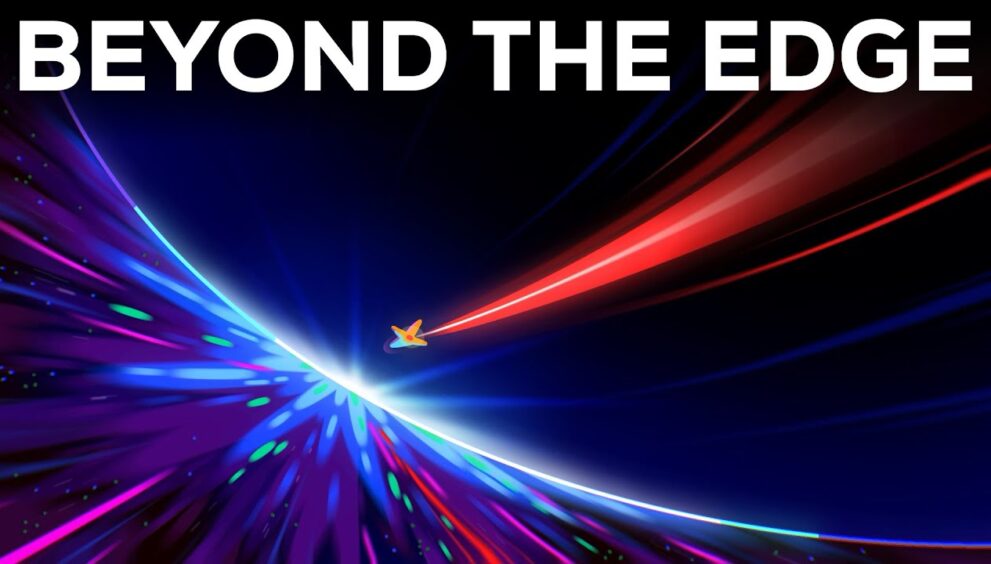The Paradox of an Infinite Universe: Exploring the Edge of the Cosmos

Have you ever wondered if the universe is infinite? Does it have an edge that we can’t see beyond? These are questions that have puzzled scientists and thinkers for centuries. In this blog, we will delve into the fascinating world of cosmology and explore the concept of the edge of the universe.
The Observable Universe
Scientists believe that the universe had a beginning around 14 billion years ago and has been expanding ever since. This expansion has led to the creation of what we call the observable universe. The observable universe is the part of the universe that we can see and interact with. It is like a sphere centered on us, with a radius of 45 billion light years.
Within the observable universe, there are around 200 billion galaxies, each containing hundreds of billions of stars. As we look outwards into space, we are essentially looking back in time, as the light from distant objects takes time to reach us. This creates a sphere of visibility around us, beyond which we cannot see.
The Concept of Finite Universes
There are two main theories about the size and shape of the universe. The first theory suggests that the universe is truly infinite, with no boundaries or edges. In an infinite universe, you would find more and more galaxies, stars, and planets in every direction you look, stretching out forever.
The second theory proposes that the universe is finite, like the skin of an orange or the surface of a hypersphere. In a finite universe, there is a limit to how far you can travel before looping back to your starting point. This concept can be hard to visualize, but it suggests that the universe could be closed in on itself in a higher-dimensional space.
The Paradoxes of Infinity
If the universe is truly infinite, it raises many intriguing questions and paradoxes. For example, in an infinite universe, there is a possibility of encountering exact copies of yourself due to the finite number of ways particles can combine. This means that there could be an infinite number of versions of you living in parallel universes, all separated by vast distances.
While these ideas may seem like science fiction, they are based on the principles of physics and mathematics. The concept of infinity in the universe forces us to rethink our understanding of space, time, and the nature of reality itself.
The End of the Universe
Despite the mysteries and complexities of the cosmos, one thing is certain – the universe is constantly changing and evolving. From the birth of stars to the formation of galaxies, the universe is a dynamic and ever-expanding entity.
As we gaze into the night sky and ponder the vastness of space, we are reminded of our place in the universe. We are part of a cosmic tapestry that is both beautiful and awe-inspiring. While we may never fully understand the true extent of the universe, we can marvel at its wonders and embrace the mysteries that lie beyond.
































































































































































































































































































































































































































































































































































































































































![Fixing [pii_email_aa0fea1a78a192ae7d0f] Microsoft Outlook Error](https://www.huffenpost.com/wp-content/uploads/2023/03/What-Causes-the.jpg)
![Fixing [pii_email_aa0fea1a78a192ae7d0f] Microsoft Outlook Error](https://www.huffenpost.com/wp-content/uploads/2023/03/How-to-fix-the-1-1024x1024.webp)
![Quick fixes for the [pii_email_dbd9dd084703ead3b9cf] Mail Error](https://www.huffenpost.com/wp-content/uploads/2023/03/How-to-Avoid-pii_email_b6b14f95f44a83737071-Outlook-Error-1024x576.jpg)
![How to fix the [pii_email_bbf95bff57a974a71da8] in Microsoft Outlook?](https://www.huffenpost.com/wp-content/uploads/2023/03/How-To-Solve-The-pii_email_9e750e335dfd9d75badb-Outlook-Error.webp)
![How to solve the [pii_email_b6b14f95f44a83737071] Outlook Error](https://www.huffenpost.com/wp-content/uploads/2023/03/How-to-Avoid-pii_email_b6b14f95f44a83737071-Outlook-Error.png)
![Ways to fix the "[pii_email_1fb861393abed78ab415] Error](https://www.huffenpost.com/wp-content/uploads/2023/03/pii_pn_56e685559f213991c933-Error-Causes-and-Solutions2.jpg)
![How to Fix the [pii_email_e2f55b4aa7bb667da6d9] Error](https://www.huffenpost.com/wp-content/uploads/2023/03/How-to-fix-the.webp)
![What Everyone Should Know About [pii_email_59ea919492dfc2762030]](https://www.huffenpost.com/wp-content/uploads/2023/03/pii_email_aa0fea1a78a192ae7d0f-Email-Error-and-Its-Solutions-1024x683.jpg)
![How to Fix the [pii_pn_5359771d15a46e7b88bf] Outlook Email Error](https://www.huffenpost.com/wp-content/uploads/2023/03/pii_email_57a4a2f20ec6813a8481-SMTP-Error-Solution-2.jpg)


























































































